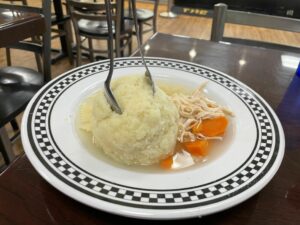Matzah ball soup is always a classic dish on Passover, and in my family, it was tradition for my grandmother to make it for the guests. She would drive up to the house of whoever was hosting that year’s seder with huge Tupperware containers of broth and matzah balls, heavy enough that she often required multiple people to help her bring them into the house. Grandma’s recipe for matzah ball soup wasn’t much different from the standard recipe on the side of a container of matzah meal, with one key difference — she put seltzer in her matzah balls. The carbonation made them soft and fluffy.
Grandma passed away while I was in high school, and the duty of making matzah ball soup for Passover has been passed on to other members of my family. To this day, though, we still use her trick of using seltzer to make matzah balls.
Reflecting on this memory made me think about a different kind of matzah ball soup: the kind served at restaurants. Matzah ball soup has cemented itself on the menu of many kosher restaurants, diners and delis. And it made me curious: what makes matzah ball soups from different restaurants, well, different? And what Passover memories go into making them?
I tried matzah ball soups from three Jewish-owned restaurants in the Baltimore area, and here’s what I found.
Mikey and Mel’s Deli – Fulton

The thing you’ll immediately notice upon ordering a bowl of matzah ball soup at Mikey and Mel’s is the size of the matzah ball. It dwarfed the rest of the meat, vegetables and pasta floating in the broth, and I would estimate that the one that came in the bowl I tried was the size of a baseball.
Because of its girth, the matzah ball retains heat long after the broth cools off. I let the soup cool for a bit after my initial tasting, and the ball remained warm and fluffy.
Ironically, Mikey and Mel’s co-founder Aaron Magden says that the deli’s Passover offerings are informed by some less-than-delicious holiday food from his and his brother Harley’s childhoods.
“My memories go back to my relatives not being able to cook good soup,” he said. “So that’s what motivated us to come out with a matzah ball soup that’s really over-the-top.”
Another thing that sets the deli’s soup apart is its use of bow tie pasta rather than traditional egg noodles. For orders on Passover, though, these noodles are removed due to the holiday’s rules on eating leavened foods.
The soup is one of Mikey and Mel’s most popular items. While I was there, I heard several people ordering it at the counter. General manager Scott Scicchitano echoed this sentiment, adding that the deli experiences more traffic around Passover due to its dedicated Passover menu.
“The day before [Passover], we always get a lot of orders for matzah ball soup,” Scicchitano said. “It’s just good. You can do matzah ball soup badly or you can do it good, and I believe that we do it very well.”
Accents Grill – Baltimore
When I started working on this article, I asked around in Jewish Baltimore-focused Facebook groups to see what restaurant people thought had the best matzah ball soup.
Every time, Accents Grill was mentioned, so I had to make the trip to see for myself. The restaurant may be better known for its tour-the-world Shabbat menus and its kosher sushi offerings, but it still has a very good matzah ball soup, and I quickly saw why people recommended it so highly.
This soup had the smallest matzah balls out of the soups I tried and no noodles, making it a lighter option. Accents Grill was also the only restaurant I tried that added celery to their soup, which gave it more varied textures. I was given a generous amount of celery and carrots, too, so this could be the perfect matzah ball soup for veggie-lovers.
But the chicken in this one also stood out to me. Accents Grill uses some darker meat in its soup, which is softer and more flavorful.
If just one bowl isn’t enough, the restaurant also offers a larger portion as part of its annual Passover menu, along with a variety of other holiday dishes.
The Essen Room – Pikesville

The Essen Room used to sell shirts saying “We serve our balls big,” and while they don’t have those shirts available anymore, the statement still rings true. The Pikesville deli’s matzah ball soup comes with two spoons stabbed into one giant matzah ball, bringing to mind the sword in the stone.
Both the broth and the matzah balls are made on-site, though the soup takes a backseat to the massive ball in each serving. It proved so daunting that, when I took the soup home, I had to cut up the ball so it would fit in a takeout container.
The broth is on the saltier side, but the matzah ball and the more thinly sliced carrots soak up its flavor well.
Lou Ellison, The Essen Room’s owner, says that he has always made the matzah ball soup for his family’s Passover seders. While his family seders have gotten smaller over the years, the demand for soup has increased as he started to make the dish available at his restaurant.
“I used to have to make 35 every year for our family’s seder,” he quipped. “Now, I have to make a few more.”
Interestingly, The Essen Room used to put jelly beans in their matzah balls during the rare occasions that Passover would coincide with Easter. While the restaurant doesn’t do that anymore, Ellison still has a tradition of hiding a single jelly bean in a matzah ball at his family seders and seeing who gets it.
He notes that he believes the taste and size is what makes The Essen Room’s soup unique.
“The majority of our customers use us for the holidays,” Ellison added. “We like to adjust our menu a little bit so we can provide everything our loyal neighbors and customers want.”






